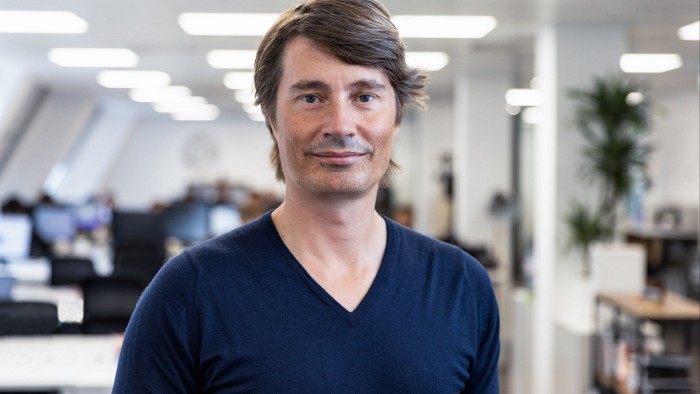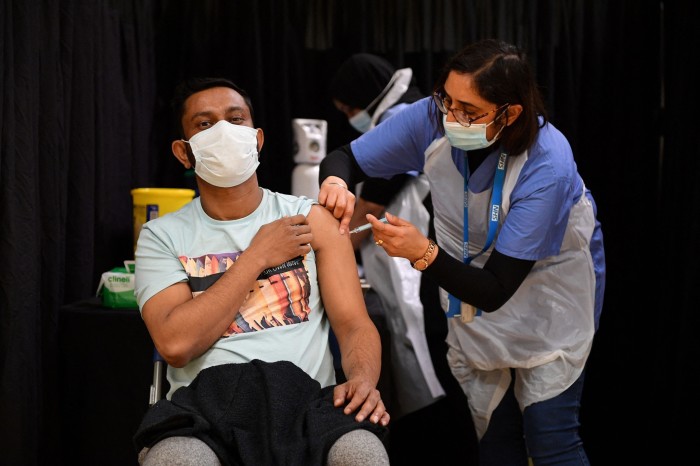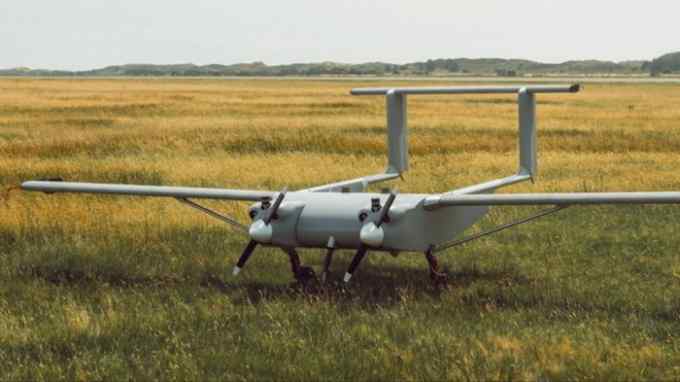Airfinity gives decision makers big picture on health

Simply sign up to the Health sector myFT Digest -- delivered directly to your inbox.
Rasmus Bech Hansen was consulting for life science companies when his mother developed cancer. He wanted to know more about which drugs were available and where the clinical trials were but, despite specialising in the industry, he was surprised at how hard it was to find the data he needed.
So, in 2015, he decided to create a service that would break down the silos in the system and give companies and governments the information they needed.
“I thought there was a meaningful thing to spend the rest of my life on, hopefully,” the Danish entrepreneur explains.
He founded Airfinity — and, eight years later, it has been selected as the winning company in the healthcare category of the FT’s 2023 Tech Champions survey.
Airfinity’s aim is to take analytics and models more commonly adopted by insurers and hedge funds and use them to track a wide range of data on disease patterns and the pharmaceutical industry.
Its recent studies have looked at the likely progress of Covid, flu and respiratory syncytial virus (RSV) — the so-called “tripledemic” — this winter, and at how climate change will influence the spread of dengue. Both provide information that is valuable to policymakers when deciding priorities for stretched health systems.
The London-based start-up began by compiling the reams of unstructured data presented at medical congresses. However, its breakthrough moment came when the Covid-19 pandemic struck. Because the company had only 20 people, it found it easier to pivot to tracking the virus and its consequences than bigger rivals did. In the case of other diseases, larger data suppliers had an edge because they had historical data, but they had no advantage when dealing with this novel pathogen.
Sir John Bell, regius professor of medicine at Oxford, who was involved in the UK’s pandemic response, says Airfinity’s data was “probably the most expansive, accurate and helpful of the multiple data sets on an international scale”.
As well as tracking how Covid-19 spread across the world, Airfinity assembled data on the hundreds of vaccine programmes, and monitored bottlenecks in the complex supply chains.
Governments, companies and non-profits eager for more information about a virus that was reshaping the global economy bought subscriptions, which boosted Airfinity’s revenue by 16,000 per cent between 2019 and 2022, the company reported in an interview.
Drugmaker AstraZeneca used Airfinity’s data to estimate the impact both of the Covid-19 vaccine it developed with the University of Oxford, and of its monoclonal antibody Evusheld, used to protect those at high risk of severe Covid. Airfinity calculated that more than 6mn lives were saved during the first year of the vaccine’s use.

Iskra Reic, executive vice-president at AstraZeneca, says Airfinity was different from its rivals because it combined the “nimbleness of real time data” with a group of scientists that could analyse it.
“It was extremely valuable in providing independent validation of the positive impact the vaccine and monoclonals had on public health and raising awareness of the need to protect at-risk individuals from the burden of infectious disease,” she says.
During the pandemic, customers also included decision makers outside the pharmaceutical industry.
Investors were among those who paid close attention, for example, when Airfinity predicted that the BioNTech/Pfizer Covid-19 vaccine was on track to meet its target of 60 per cent efficacy more than two weeks before the company reported its results in November 2020. Airfinity monitored case rates around clinical trial sites to estimate how quickly trials were likely to reach the number of infections at which they would be called off. The longer the trial ran, the more effective the vaccine was likely to be.
As China began, finally, to open up its economy in early 2022, companies trying to make decisions about their presence in the country turned to Airfinity to forecast the impact of the end of “zero Covid”.
But Airfinity’s predictions have not been infallible. Bech Hansen says some of the biggest mistakes came when estimating the uptake of Covid-19 vaccines, therapeutics and tests as the pandemic waned. “We were surprised by basically human behaviour, that people stopped wanting to take the vaccine,” he says.
One epidemiologist criticises the forecasts for being overly definitive: for giving a single number for the size and timing of flu and Covid peaks several months in advance, for example, and displaying little uncertainty or caveats about the methodology.
He also says he would like to see the company submit its predictions to forecast hubs, which encourage collaboration between forecasting teams and try to show the public the range of possible future outcomes.
In response, Airfinity says it is “very transparent” on how it sources data, its assumptions and its methodology. “This approach means that, even when we are wrong, we can derive insights on the disease dynamics that are in itself useful for clients and the wider public,” it says. But it adds that analysis designed for press distribution is distilled into its “simplest form” to make it easier to understand.
Now that the pandemic has passed, Airfinity’s staff — currently numbering about 120 — are taking on new challenges, from tracking the threat of other infectious diseases to examining the impact of the new generation of weight loss drugs.
As drugmakers try to convince healthcare systems to pay for the treatments by promoting how much they will save in the long run, Airfinity also helps to work out drug development costs. For example, it recently calculated that it could cost $1.1mn for Wegovy, the Novo Nordisk drug, to prevent one heart attack, stroke or cardiovascular death. Novo Nordisk did not comment.
Airfinity has even been able to apply pandemic lessons to tackling other health crises. Bech Hansen says obesity raises some of the same questions his company tackled with Covid: “Like, how is this market going to play out? What is the true demand going to be? What is the impact of all these drugs going to be on other diseases?”

Comments